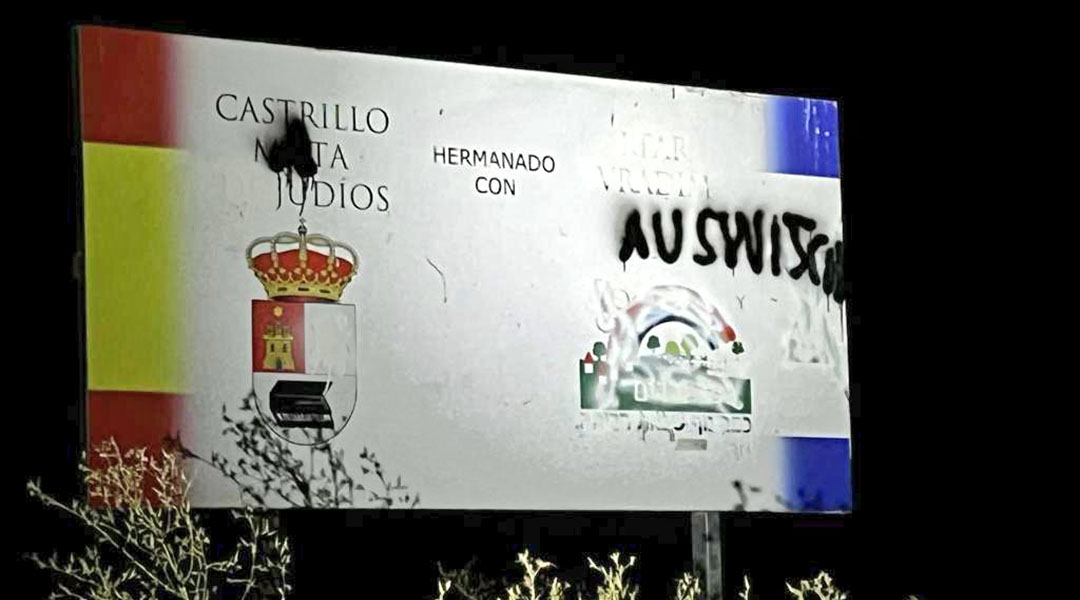Nazi sympathizers charged with antisemitic vandalism in Spanish town once named Fort Kill the Jews
The three people arrested are also suspected of vandalizing a Jewish cemetery, synagogue and community center near Madrid

A town in Spain that once served as a refuge for Sephardic Jews was vandalized. (Courtesy of Lorenzo Rodriguez)
(JTA) — Three apparent Nazi sympathizers have been arrested in connection with a rash of antisemitic vandalism in a tiny Spanish town whose name for nearly 400 years was Castrillo Matajudios — or Fort Kill the Jews.
For years, the town, which changed its name in 2015 to Castrillo Mota De Judios, or Fort Jews Hill, has been plagued by antisemitic graffiti. Some of it referenced the Holocaust, while others had to do with the Inquisition, the medieval expulsion of Jews from Spain. All of it vexed the town’s mayor, who has sought to rehabilitate the town’s image and put it on the map as a destination of Jewish significance.
“These are cowardly, intolerant and ignorant people who do not value neither heritage nor people; nor do they have respect for anyone or anything,” the mayor, Lorenzo Rodriguez, wrote when sharing pictures of some of the damage last year. “These intolerant people are not allowed here.”
Now, Spanish police have arrested three people — two men and a woman — whom they said were responsible for the incidents, as well as others in which Jewish sites were vandalized near Madrid.
“The investigation has shown that the detainees are related to xenophobic movements with a marked antisemitic discourse, whose messages focus on hatred against the Jewish population and its environment,” Spain’s Civil Guard law enforcement agancy said in a statement. “The three detainees are considered members of a radical right-wing criminal group that acted in concert to commit this type of crime, adopting security measures to avoid being discovered.”
In searching the suspects’ houses, police found Nazi paraphernalia, as well as non-lethal weapons, the Civil Guard said.
“Camp Kill Jews, twinned with Aushwitch [sic],” one instance of graffiti in Castrillo Mota De Judios read. Others included slogans like, “Juden Raus,” “Long live Catholic monarchs,” “The mayor’s sold out to the killer Jew,” and referenced Tomás de Torquemada, the high inquisitor of the Spanish inquisition.
Vandals also attempted to burn down the town’s flag, which bears the Star of David, as early as a year ago. Last summer, they allegedly spread more graffiti and set fires around the town to further harass the residents, after the town was twinned with an Israeli town, Kfar Vradim.
The suspects were also believed to be responsible for antisemitic incidents near Madrid, including posting antisemitic messages on the door of a synagogue and drawing graffiti on a Jewish community center and a Jewish cemetery.
Despite going by the name Castrillo Matajudios for nearly 400 years, the town’s 52 residents voted to change the name in 2014 and the change was imposed in 2015. Archival records showed that before the Spanish expulsion and onset of the Inquisition, it was in fact originally settled by Jews in 1035 fleeing a nearby pogrom, who named it Castrillo Motajudios, or “Fort Jew’s Hill.”
The expulsion, and following inquisition — aimed at rooting out any remaining Jews and Muslims who had insincerely converted to Catholicism, resulted in terms referencing violence against Jews to enter the vernacular in Spain and the wider Spanish-speaking world. Matar Judios — To Kill Jews — is still a common term for Easter festivals in Northern Spain where celebrants enjoy spiked lemonade, while the surname Matajudios is also a common last name in Colombia. In France, a town bears the name Mort-Aux-Juifs, which has a similar meaning.
Since the change, the town has also proposed building a Jewish research center to study the pre-expulsion Jewish heritage of the region.
This article originally appeared on JTA.org.
A message from our CEO & publisher Rachel Fishman Feddersen
I hope you appreciated this article. Before you go, I’d like to ask you to please support the Forward’s award-winning, nonprofit journalism during this critical time.
We’ve set a goal to raise $260,000 by December 31. That’s an ambitious goal, but one that will give us the resources we need to invest in the high quality news, opinion, analysis and cultural coverage that isn’t available anywhere else.
If you feel inspired to make an impact, now is the time to give something back. Join us as a member at your most generous level.
— Rachel Fishman Feddersen, Publisher and CEO